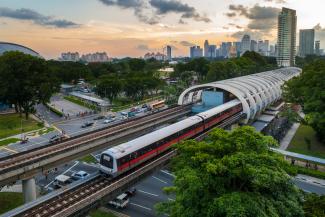
Singapore, 28 September 2022 (Wednesday) – The Institute of Service Excellence (ISE) (卓越服务研究院) at Singapore Management University (SMU) today released the 2022 Customer Satisfaction Index of Singapore (CSISG) research findings for the Land Transport sector, comprising of the Mass Rapid Transit System (MRT), Public Buses, and Point-to-Point Transport (P2P) sub-sectors.
The study, which surveyed commuters between April and July, showed satisfaction with public transport remained steady, despite a strong increase in MRT and bus ridership.
The MRT sub-sector had an overall CSISG score of 74.2 points (on a 0 to 100 scale), while Public Buses scored 74.5 points. Both performances were virtually unchanged compared to the previous year. The P2P sub-sector scored 73.4 points, a small year-on-year increase of 0.4%; the change was not statistically significant.
Delving deeper into the two Public Transport sub-sectors, impact analysis revealed the most important drivers of the commuting experience. For trains, the top three were “Cleanliness”, “Frequency”, and “Ride Comfort”, in order of importance. For buses, they were “Ease of Boarding”, “Ease of Moving Within the Bus”, and “Frequency”.
“While cleanliness continues to be an important aspect of the commuting experience, not surprising since Covid-19 is still very much around us, this latest analysis has shown more pragmatic concerns surface, such as bus and train arrival frequencies,” said Ms Neeta Lachmandas (妮塔.拉切曼达斯), Executive Director (执行总监) of ISE.
In addition, the study had also revealed that the commuting public was expecting to be taking more MRT and bus rides in the next 12 months. Of the public transport respondents polled, 38.4% indicated they expected to take more buses and trains, in contrast to the 6.7% that indicated they were expecting to take less rides.
“These observations suggest people are going to be moving about more often and do care about their ride experience. The findings should serve as a catalyst for public transport operators to start calibrating its infrastructure and services to meet this anticipated resurgence in demand,” suggested Ms Lachmandas.
Within the P2P sub-sector, segment analysis revealed Non-working commuters were significantly less satisfied year-on-year, scoring 72.1 points in 2022 compared to 76.5 points in 2021, a 5.7% decline. Non-working commuters were defined as students, homemakers, retirees, or the unemployed.
And compared to Working commuters, i.e., respondents that indicated they had some form of employment, the Non-working segment was also observed to have comparatively lower perceptions of value, scoring 67.7 points compared to 70.9 points for the Working segment. In addition, Non-working commuters’ satisfaction with “Ease of getting a ride” and “Waiting for a ride” were two other areas which fared significantly poorer.
“The decrease in the numbers of taxis and private hire vehicles plying the roads, coupled with higher ride prices, may have affected the P2P sub-sector’s CSISG metrics, particularly for the non-working segment, who presumably have a smaller tolerance for such discretionary spending,” surmised Ms Lachmandas.
Impact analysis for the P2P sub-sector revealed the three most important drivers of quality were “Ride Safety”, “Driver Interactions”, and “Ease of getting a ride”.
The CSISG 2022 Q2 study was conducted between April and July 2022. A total of 2,350 local residents were surveyed through online interviews.
Please refer to Annex A for a background on the CSISG and Annex B for the detailed scores.
***